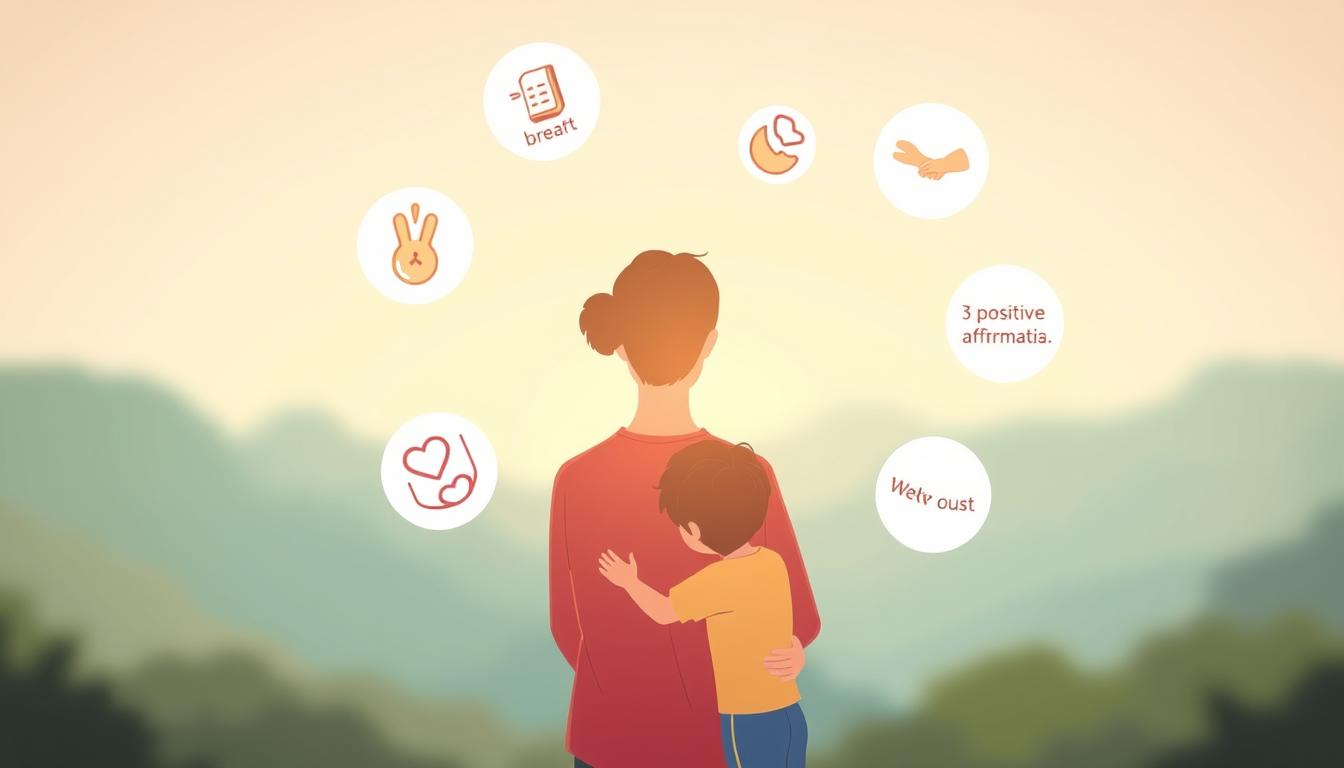Feeling overwhelmed when your child has a meltdown is common. It’s a battle between frustration and patience. But, is there a way to stay calm instead of getting caught up in chaos?
Mindful parenting offers a solution. It’s not about being perfect. It’s about choosing calm, even when your child pushes boundaries. Science proves these methods work.
You’ll learn to pause before reacting and reconnect with your child’s needs. This turns stressful moments into chances to teach and grow.
These seven science-backed methods will make you more resilient. You’ll learn to breathe through tantrums and listen with empathy. You’ll set boundaries without yelling. Each tip aims to strengthen your bond and reduce stress for all. Ready to turn frustration into calm and chaos into connection? Let’s start.
Understanding Mindful Parenting
Mindful parenting begins with being aware. It’s about being present with your child and managing your emotions. Unlike old ways, it teaches us to think before we act. Let’s explore how this changes our daily talks.
What is Mindful Parenting?
Mindful parenting means focusing fully on the moment. It’s about watching your child without judging and knowing your feelings first. A study shows:
“Mindfulness helps parents create a calmer environment by fostering self-awareness.”
Benefits of Practicing Mindfulness
- Reduces parental stress by 40% (research shows)
- Builds emotional resilience in children
- Strengthens communication between parent and child
These benefits of mindful parenting help us connect deeply. Simple actions, like listening carefully, can turn arguments into learning moments.
How Mindfulness Affects Parenting
Science says mindfulness makes us better at making decisions. When we pause, our brain’s thinking part kicks in. This leads to calm answers instead of quick reactions. It’s a way to see problems as chances to grow. Even small actions, like deep breathing before a tantrum, are part of mindful parenting advice. It’s a skill to learn, not something to be perfect at.
Recognizing Your Triggers
Being aware of yourself is key to mindful parenting strategies. Knowing what makes you upset helps you think before you act. This way, tough moments become chances to learn and grow.
Identifying Stressful Situations
Begin by looking for patterns. Ask yourself: When do I feel most frustrated? Common things that upset you might include bedtime fights, disobedience, or sudden changes. Pay attention to your body’s signs—like clenched fists or a raised voice. These signs mean you’re getting upset.
Keeping a Journal for Reflection
Write down the who, what, when, and how of each tough moment. Use prompts like:
- What behavior triggered me?
- Did I feel overwhelmed or judged?
- How did I respond?
This helps you see what issues keep coming up and how you’re improving over time.
Strategies for Managing Triggers
When you start to feel tense, try these mindful parenting techniques:
- Pause: Take three deep breaths to calm down.
- Reframe thoughts: Change negative thoughts to positive ones. For example, “This is impossible” becomes “This is a chance to practice calm.”
- Ground yourself: Focus on your surroundings. Name 5 things you see, 4 things you feel, 3 things you hear, 2 things you smell, and 1 thing you taste.
These steps help you make better choices instead of reacting automatically.
Techniques for Staying Calm
Learning mindful parenting techniques means taking steps every day. Let’s look at three ways to stay calm, even when things get crazy.
Deep Breathing Exercises
Deep breathing can calm your mind. Try the 4-7-8 technique: breathe in for 4 seconds, hold for 7, then breathe out for 8. Keep doing this until you feel calm. Box breathing is also good for time-outs: breathe in, hold, breathe out, each for 4 seconds.
Do these exercises when you feel stressed. They help break the cycle of tension.
Practicing Gratitude
Focus on the good things. Write down three good things each evening, no matter how small. This habit changes your brain to see the positive side of things.
When you feel frustrated, say, “I’m grateful for…” This helps calm you down.
Utilizing Visual Cues
Put sticky notes with reminders like “Breathe” or “Pause” in places you see often. Try the fridge, bathroom mirror, or car dashboard. Use a smooth stone or a mindfulness app icon as a reminder to pause and breathe.
These cues help you stay present during tough moments.
Effective Communication Strategies
Good communication builds trust and understanding. Mindful parenting tips like active listening and clear expression help you connect with your child. Here’s how to have meaningful talks that strengthen your bond.
Listening to Your Child’s Needs
- Pause distractions: Turn off devices and give your full attention.
- Reflect feelings: Say, “It sounds like you’re upset about school,” to validate emotions.
- Ask open-ended questions: “What do you think about today’s science project?” encourages thoughtful responses.
Using “I” Statements
Frame your perspective without blame. Instead of “You’re always loud,” try: “I feel stressed when voices rise. Let’s talk calmly.” This shows mindful parenting for children by being accountable.
Encouraging Open Dialogue
Start daily check-ins with questions like: “What made you smile today?” or “What challenge did you overcome?” For younger kids, use play-based conversations—like puppet shows—to explore feelings. Older children enjoy honest talks about their day.
Remember, being consistent is key. Small, intentional chats build confidence. Your child will feel heard and understood.
Setting Boundaries with Compassion
Mindful parenting is all about rules and empathy working together. Toddlers love routine, but their needs change as they grow. Here’s how to make rules that keep them safe and help them grow emotionally.
Establishing Consistent Rules
Begin by setting clear rules your child can understand. For instance:
- Bedtime: “We turn off screens 30 minutes before sleep.”
- Mealtime: “Forks stay on the table during meals.”
- Screen Time: “TV ends when the timer rings.”
Being consistent helps build trust, especially with toddlers. Use charts or timers to help them remember these mindful parenting for toddlers rules.
The Importance of Flexibility
“Rigid rules without compassion become barriers, not guides.”
When dealing with tantrums or changes, it’s time for calm adjustments. If your child doesn’t want to wear shoes, say: “Let’s pick which socks to wear first.” Be firm on safety but flexible on small things. This mix of structure and empathy builds trust.
How to Reassess Boundaries
Check your rules every 3-6 months. Ask yourself:
- Does this rule help their growth?
- Does it let them explore?
- Is the language kind and clear?
Let older toddlers make simple choices, like picking between two snacks. This mindful parenting strategies way makes setting rules a team effort, not a fight.
Practicing Patience in Challenging Moments

Even the calmest parent faces moments when patience runs out. Practicing mindful parenting turns these moments into chances to grow. Small daily practices help when emotions get high.
Mindfulness Exercises for Parents
Simple techniques keep you in the present. Try these mindful parenting techniques to reset during stress:
- 5-4-3-2-1 Grounding: Name 5 things you see, 4 you can touch, 3 you hear, 2 you smell, and 1 you taste.
- Box Breathing: Inhale 4 seconds, hold 4, exhale 4, and hold empty for 4 seconds. Repeat until calm.
Techniques for Grounding Yourself
- Pause: Close your eyes and count breaths to 10.
- Label sensations: Whisper “I feel angry” instead of acting on it.
Finding Calm in Chaos
“Chaos is a chance to practice mindful parenting with intention, not perfection.” — Mindful Parenting Journal
During tantrums or conflicts, try this triage approach:
- Step back physically to create space.
- Speak softly and slowly to model calmness.
- Redirect focus to one priority at a time.
These mindful parenting techniques turn crises into teachable moments for both parent and child.
Encouraging Your Child’s Emotional Expression
Building emotional intelligence starts with making your child feel heard. Mindful parenting is not just about controlling your reactions. It’s also about helping your child understand and manage their feelings. Let’s look at simple ways to help them become more emotionally aware every day.
Teaching Empathy and Understanding
Empathy grows with practice. Ask your child how characters in books or shows feel. Role-play sharing toys or comforting a friend. Mindful parenting advice says to use daily moments to talk about feelings: “Your sister looks sad when you take her toy. Let’s see how we can help.”
Creating a Safe Space for Feelings
Make a “calm corner” with soft cushions, coloring books, or a feelings chart. Tell your child it’s okay to use it when they feel overwhelmed. Say things like: “It’s okay to feel angry. Let’s breathe together.” This shows your child that all feelings are okay, a key part of mindful parenting.
Role-Playing Emotions Together
Practice feeling emotions by acting out scenarios: “Pretend you’re a teacher whose student is crying. How would you respond?” Switch roles to see things from different angles. These activities turn feelings into learning moments, helping your bond grow stronger.
Incorporating Mindfulness into Daily Routines

Small changes can make a big difference in your bond with your kids. Here’s how to add mindful parenting tips to your daily life easily.
Mindful Mealtimes
Slow down and enjoy meals together. Turn off devices and focus on the moment:
- Ask questions like “What’s one thing you noticed today?”
- Let kids help chop veggies or set the table
- Pause to thank each other for small kindnesses
Mindful Bedtime Rituals
Evenings can be calm with these steps:
- Inhale calming scents like lavender while reading together
- Practice “body scan” breathing before lights out
- End with “three good things” reflections
These mindful parenting tips help you reflect on the day quietly.
Mindfulness in Playtime
Make play more meaningful by trying:
- Sensory bins with sand, water, or nature items
- “I Spy” games noticing colors/textures
- Yoga poses named after animals or shapes
These activities make playtime mindful, keeping you both present.
Resources for Further Learning
Expand your mindful parenting journey with mindful parenting resources and mindful parenting advice. These tools are designed to help you grow. They can build your skills and connect you with others:
Recommended Books on Mindful Parenting
- “The Mindful Parent” by Susan Kaiser Greenland – Practical exercises to navigate daily challenges with calm.
- “No-Drama Discipline” by Daniel J. Siegel and Tina Payne Bryson – Tools for responding, not reacting, to emotional outbursts.
- “Mindful Parenting in a Messy World” by Ron Taffel – Strategies for fostering resilience in kids through mindful communication.
Online Courses and Workshops
Join structured programs like:
- Mindful.org’s “Parenting from the Inside Out” – A 6-week course on self-reflection and child-centered practices.
- Greater Good Science Center’s free webinars on emotional regulation and mindful discipline.
Community Support and Groups
Connect with others through:
- Local Meetup groups like the Mindful Parenting Collective for in-person discussions.
- Online forums such as the Parenting with Presence Facebook community.
“Sharing experiences with other parents made all the difference. It’s okay to ask for help.” – Sarah L., mindfulness group member
Every resource offers a step forward, whether through reading, learning, or connecting. Small steps add up to meaningful change.
Conclusion: Embracing the Journey of Mindful Parenting
Mindful parenting isn’t about being perfect. It’s about making progress. Every breath, every pause, and every choice to respond instead of react helps you and your child. This practice gets stronger over time, even when things get tough.
Reflecting on Your Progress
Notice how you handle stressful moments. Ask yourself: *Did I stay calm during a tantrum? Did I listen without interrupting?* These small changes add up. They show that mindful parenting strategies are becoming part of your routine.
Celebrating Small Wins
Give yourself credit for big and small wins. A deep breath before responding, a bedtime routine that eases stress, or a moment of gratitude at dinner matter. These victories show mindful parenting is about connection and growth, not flawlessness.
The Ongoing Nature of Mindful Parenting
Your approach will evolve as your kids grow. Try new strategies like journaling or mindful breathing as needed. Books like The Mindful Parent or apps like Calm offer fresh ideas. Mindfulness adapts to life’s changes, ensuring harmony in every phase of family life.

